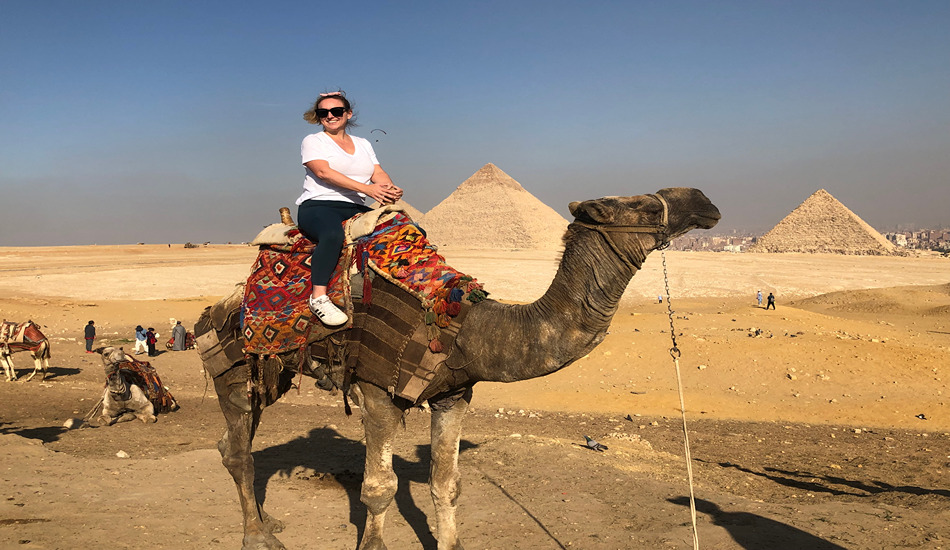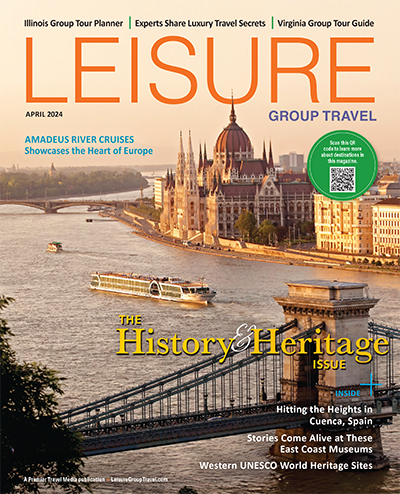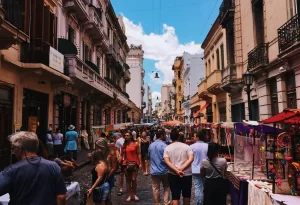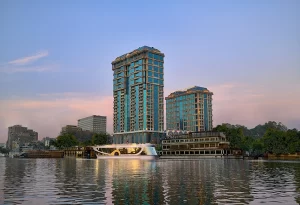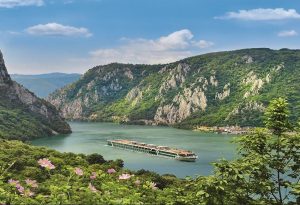A week-long adventure with Goway Travel erases any trepidations about traveling to this Middle Eastern country. Egypt is safe, welcoming and full of wonders.
Story and photos By Randy Mink, Senior Editor
Egypt! A few weeks ago, I finally made it to the land of the Pyramids and King Tutankhamen, Cleopatra and Queen Nefertiti.
In the travel world, the term “bucket list” may be overused, but Egypt had always been on my personal agenda, and now it’s been checked off. This fascinating desert country straddling Africa and Asia was everything I had hoped it would be.
With all that’s going on in the Middle East these days, was I scared about venturing to this part of the world?
Not at all.
Actually, now is a good time to go because you’ll avoid the usual hordes of tourists. The Israel-Hamas war and related events have kept visitors away. Recent cancellations have put a damper on the tourism industry, an important sector of Egypt’s economy.
While Egypt shares borders with Israel, Gaza and the Red Sea, I rarely gave the current geopolitical situation much thought as my small Goway Travel group spent a week touring Cairo, Alexandria, and all the great temples, tombs and museums that showcase ancient Egyptian civilization.
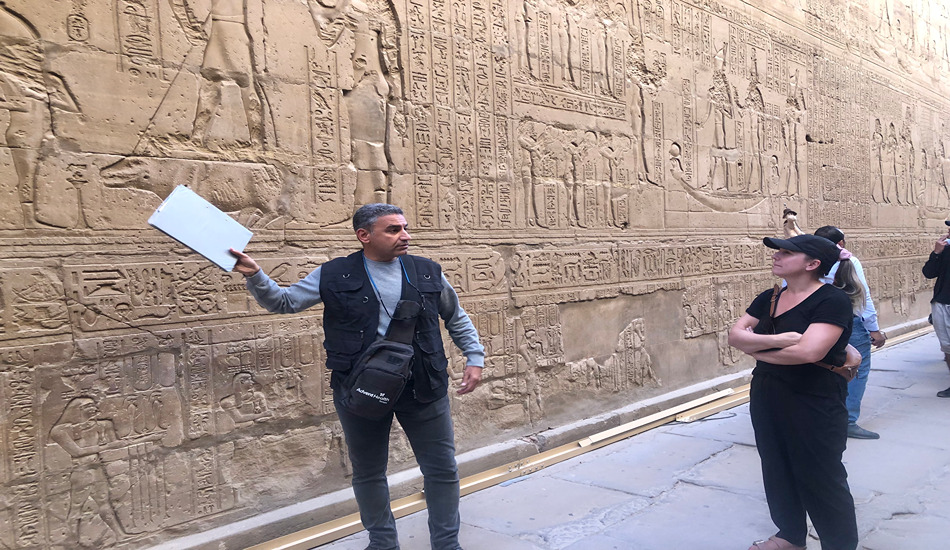
An Egyptologist guide enlightens tour members at the Temple of Edfu, which was started in 237 B.C. and finished 180 years later.
On our first day in Cairo, we got a peek at the new, partially opened $1 billion Grand Egyptian Museum, which has been in the works for years. Another highlight was a three-night cruise from Aswan to Luxor on the Nile, the world’s longest river. These places are far from any conflict zones.
Egypt is Safe and a Good Value
Our leader, Renee Stanton-Defaria, Goway’s director of sales, admitted she had thought about the current war before arriving in Egypt, but it didn’t cross her mind while there.
“I never felt an ounce of fear or felt unsafe at all during my visit,” she said. “There’s security wherever you go, and that puts your mind at ease.”
Pointing out that Egypt has not been involved in a war since 1973, Stanton-Defaria declared, “We do not take people into war zones.”
She continues, “I highly recommend advising your clients to consider booking a trip to Egypt at this very moment. Not only are there fewer crowds, but the dollar-to-Egyptian-pounds exchange rate is currently at an all-time high, making the vacation an exceptionally great value.”
At the five-star Fairmont Nile City Hotel in Cairo, Stanton-Defaria said she paid only $15 for a room-service meal that included a drink, salad and pasta. On our Nile cruise, she observed that a massage cost only about half of what it would at home. “You can treat yourself here and not feel guilty.”
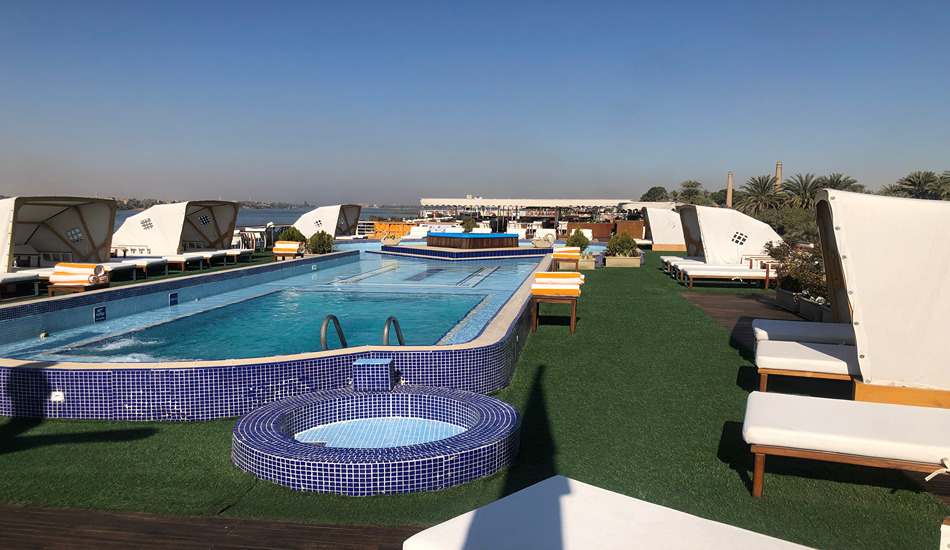
Guests on the Sonesta St. George river ship can relax in cabanas on the sun deck as they sail down the Nile.
Our ship, the luxuriously appointed, air-conditioned Sonesta St. George, had only 30 of its 57 cabins occupied. Normally, many winter sailings would be sold out, but, as boat manager Samir Ahdy lamented, cancellations rolled in after the October 7 attack on Israel that frightened travelers away from the region. Before that tragic event, the ship was so booked up that it was hard to reserve cabins on the date of choice.
“Anyone who knows anything about Egypt knows there is nothing to worry about,” Ahdy said. “Life is more than normal here.”
Our Goway gang saw a number of Chinese and Japanese groups at the tourist sites but not many North American ones. On my EgyptAir flight from Washington Dulles International Airport to Cairo, there were few tourists; most passengers seemed to be Egyptian residents or ex-patriates living in the U.S.
At some of the most popular tourist places, the crowds seemed rather thick, and bus parking lots looked jammed. But I was told that was nothing compared to what normally occurs in peak season.
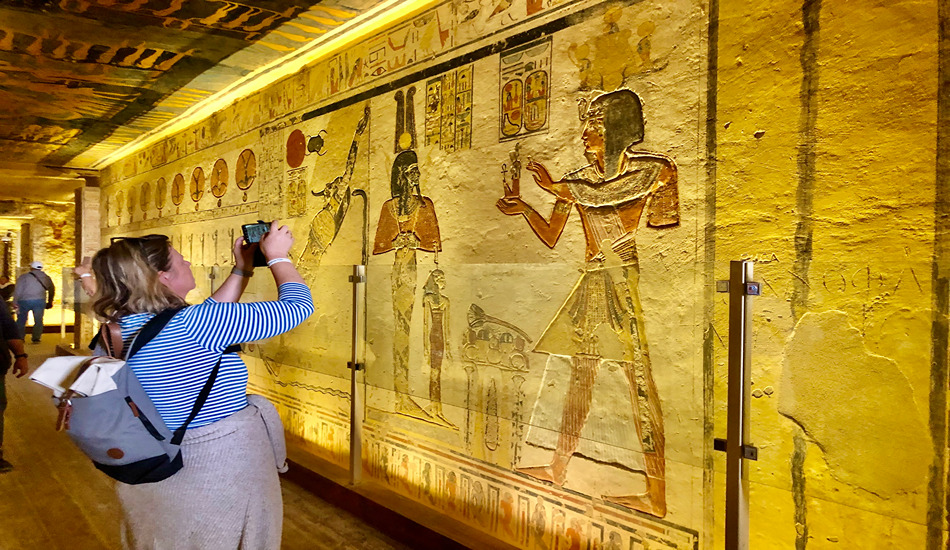
Some pharaoh tombs in the Valley of the Kings have been exquisitely restored.
Fellow tour member Cece Drummond, vice president, strategic partnerships for Travelsavers network of travel advisors, said, “I never once felt safety to be an issue….While there is some concern about global unrest in the region, travelers should not wait to visit this area of the world. Go now before the crowds return and the cost increases.”
Goway and Its Ground Partner Smooth the Way
Slowly, tourism appears to be rebounding as people realize that Egypt is safe to visit. Some fall departures for Goway’s nine-day “Egypt Odyssey” are already sold out. The trip is part of Odysseys by Goway, a new line of small-group journeys with guaranteed departure dates. Each group has a maximum of 16 guests. Odysseys have a relaxed pace, allowing travelers to spend more time in the destination and less time in the vehicle.
Goway also customizes group trips. In fact, that is the largest part of their business. The Toronto-based company takes globetrotters to 115 countries, and its website lists more than 1,500 suggested itineraries, 14 of them in Egypt. Several tours combine Egypt with countries like Jordan, Saudi Arabia, Dubai and Qatar.
Goway’s partner on the ground in Egypt is Emeco Travel, whose staff goes above and beyond to make the experience seamless. Each of us on the trip appreciated Emeco’s meet-and-greet service at the Cairo airport. As soon as I arrived, Emeco manager Ramez Gameil handed me my visa, which he had bought in advance, so I didn’t have to wait in line to apply for it. Then our group was ushered to a waiting mini-bus for the 45-minute, late-night drive to Four Seasons Hotel Cairo at The First Residence, a five-star property attached to a luxury shopping mall in Giza, a separate city of 2.5 million.
Emeco typically provides a framework for a tour and customizes it from there, working with preferred suppliers, including hotels and Nile cruise ships rated three stars and up. Gameil said he can arrange an Egyptian cooking class or lunch with a local family. “Bellies En Route” is a walking food tour that visits eateries in downtown Cairo, giving guests a chance to sample taste treats as varied as shawarma, falafel, tajines (stews) and sugar cane juice. Two-hour Nile cruises in Cairo feature Egyptian foods and belly dancing entertainment. The sound-and-light show at the Pyramids of Giza is another experience that Emeco can set up for groups. With the expertise and years of experience offered by planners from Goway and its local representative, the possibilities are endless.
Reflections on What Makes Egypt So Inviting
On my 12-hour-long EgyptAir flight from Cairo to Washington Dulles, I had plenty of time to sit and think, so I started jotting down what I liked about Egypt. Here are a few thoughts:
- The Egyptian people are friendly and like Americans. Service at hotels and restaurants is top-notch. Shopkeepers at tourist sites are not overly aggressive, unlike in some other Arab countries.
- English is widely understood in Egypt, and many signs are in English as well as Arabic. Students start learning English in kindergarten, and those who can afford it attend English schools to further their grasp of the language. Our local guides were fluent in English, as were hotel personnel.
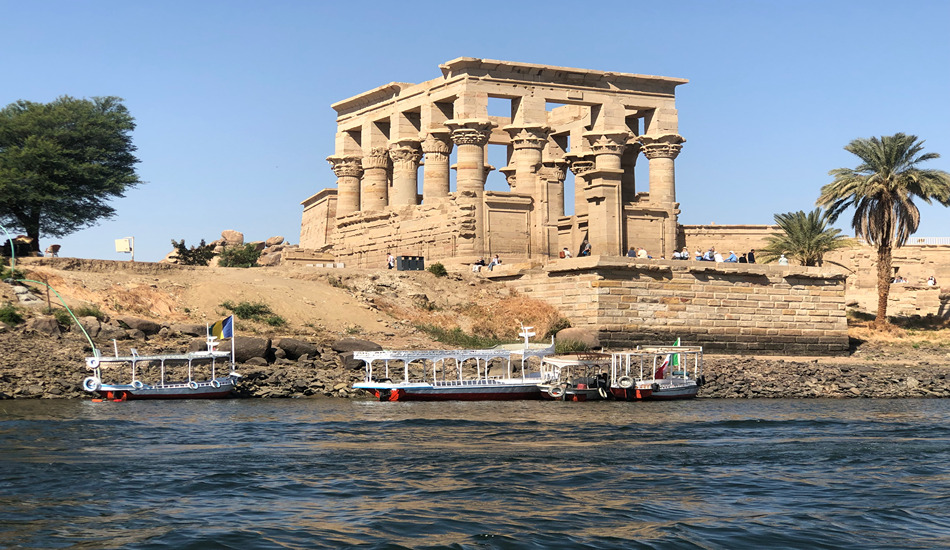
The Philae Temple Complex resides on an island in the reservoir of the Low Aswan Dam. Local motor boats shuttle Nile cruise passengers from their ship to the site.
- Egypt has sights that no other country can duplicate. That’s why it is bucket-list caliber. Of the Seven Wonders of the Ancient World, only the Pyramids of Giza survive. Located outside of Cairo, they were a highlight for me.
I’m glad I did a little reading about ancient Egypt before the trip. Just knowing the historical periods and names of certain gods and kings gave me a little head start when our Egyptologist guide started his talks. For the average American tourist coming in totally cold, the commentary can be hard to absorb. All guides on Goway tours are certified Egyptologists, so they really know what they’re talking about.
- Winter weather is great. On our February trip we were lucky enough to have sunny days in the 70s, even low 80s, with nights and early mornings on the chilly side. I can’t imagine traipsing through the archaeological sites in the summer heat. Egypt is mostly desert; there is not a lot of shade.
- Shopping in Egypt is fun. During our Nile cruise in southern Egypt, or Upper Egypt as they call it, historical sightseeing on shore was broken up by stops at shops specializing in alabaster, teas and spices, papyrus artwork, cotton fabrics and essential oils. I didn’t buy much but enjoyed the product demonstrations and mingling with locals.
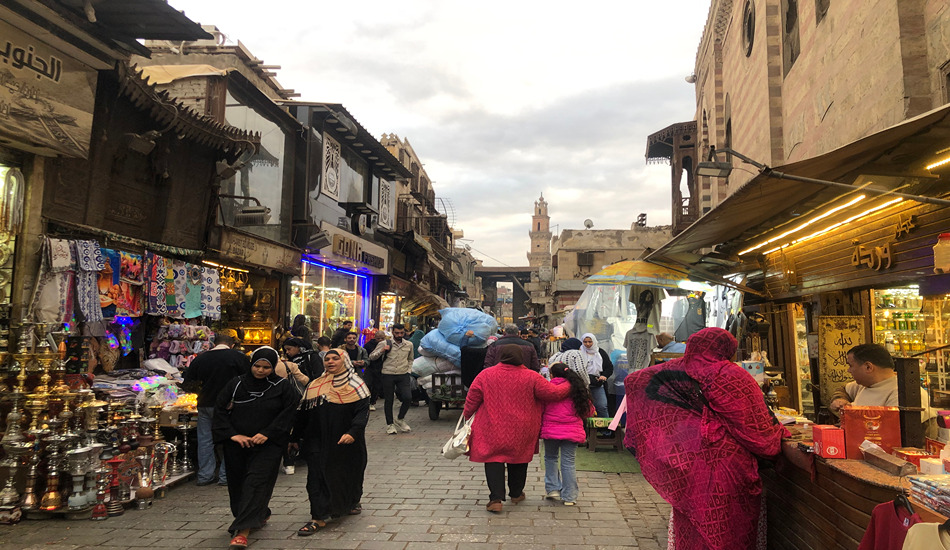
Khan-el-Khalili Market, in the historic center of Cairo, has all the trappings of a typical Arab souk.
In Cairo I wish I’d had more time to poke around the famous Khan-el-Khalili Market, a traditional Middle Eastern bazaar. From an antiques dealer I bought a Pepsi sign in Arabic that I now display at home with my other soft drink memorabilia.
- Prices are reasonable. Whether for drinks, meals or souvenirs, it’s always a treat when you pay out less than you would at home.
Solid Infrastructure and Layers of Security
- Tourism infrastructure is good. Egypt has modern roads, airports, hotels and restaurants. Our two domestic EgyptAir flights went like clockwork. We were pampered at the Four Seasons hotels in Cairo and Alexandria, the Fairmont in Cairo and the Sonesta St. George, a floating hotel with bountiful buffets, a la carte dining and a sun deck with cabanas and swimming pool.
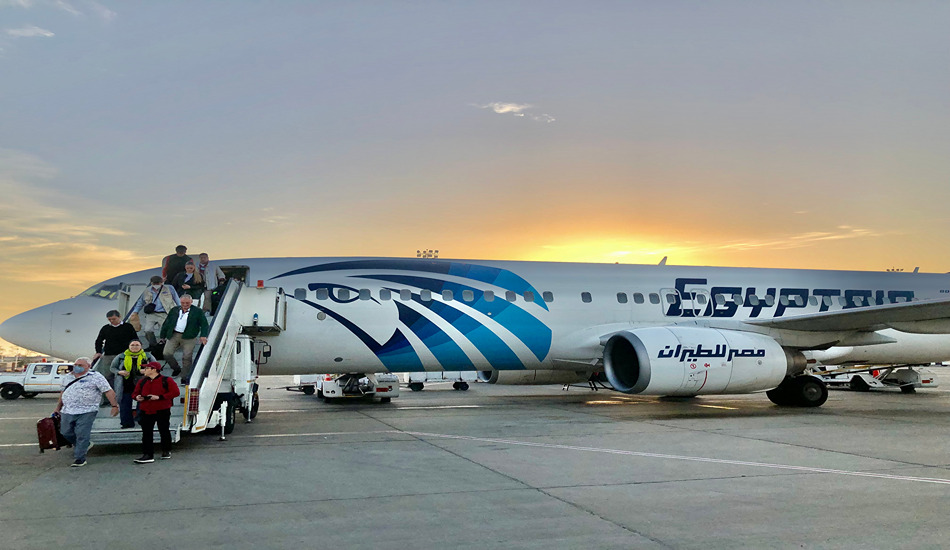
Our EgyptAir flight from Cairo arrives in Aswan, a Nile River city of 2.5 million in southern Egypt.
The tap water in Cairo and Alexandria was probably okay for us tourists to drink, but hotels provide every room with complimentary bottled water, as do Nile cruise ships. The manager of our ship advised us, on several occasions, not to drink the tap water or use it for brushing our teeth.
- Restaurants featured on tour itineraries maintain high food and hygiene standards. Memorable meals in Alexandria included a seafood lunch at the Fish Market on the Mediterranean waterfront and grilled specialties dished up by Byblos, a swank Lebanese restaurant at the Four Seasons. On the outdoor terrace of Hill-Top Restaurant at Al-Azhar Park, an oasis of greenery overlooking Old Cairo, our Goway group feasted on chicken and lamb kebabs, rice and french fries, and dipped puffy pita bread into creamy sauces—tahini, hummus and babaganoush.
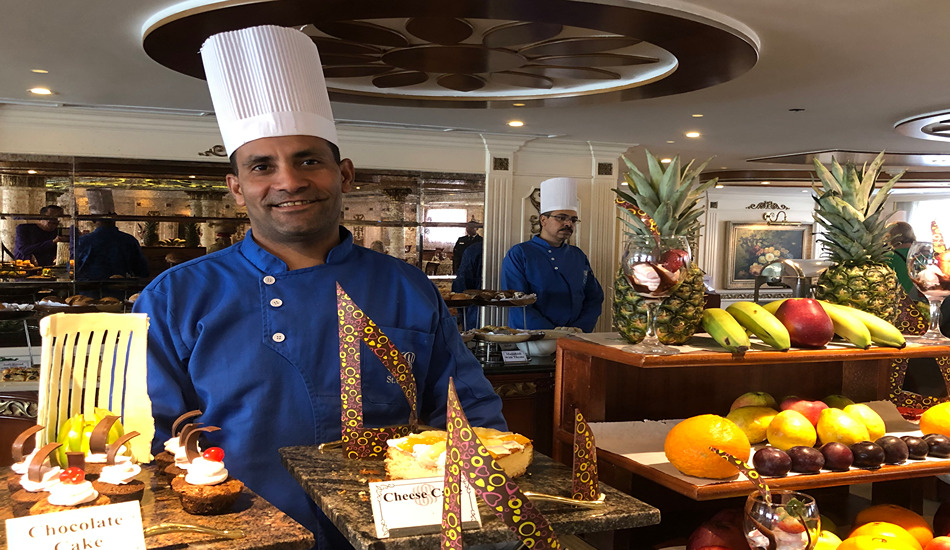
Passengers cruising the Nile on the Sonesta St. George enjoy three phenomenal meals a day.
Food on the Sonesta St. George was outstanding and plentiful. On the Egyptian Buffet the second night, they fried falafel on the spot. I counted 12 different desserts on the dessert table, 11 bread varieties on the bread table.
- Ample security measures throughout Egypt gave me a sense of, well, security. The better hotels all have metal detectors at the entrance, but this is nothing new in the Middle East. That has been the case in Israel, Jordan and other countries for years. At the Four Seasons in Alexandria, hotel security guards with a dog checked out our mini-bus before we could get through the gate. Sometimes you’ll see both tourism police and armed soldiers in army fatigues stationed at the hotel or tourist site. To get to my room at the Fairmont in Cairo, I had to go through metal detectors at two locations and then swipe my key card at two points.
At the Cairo airport, I counted seven times that I had to go through a luggage check, undergo a body search or show a document before arriving at the gate for my flight home. Visitors are required to pass through metal detectors at three points before entering Cairo’s Egyptian Museum. It seems like there are privately employed or government-paid guards everywhere you go in Egypt.
For up-to-date information on destinations around the world, you can subscribe to Leisure Group Travel for FREE
Lead photo: Renee Stanton-Defaria, Goway’s director of sales, relishes her visit to the Pyramids of Giza.


